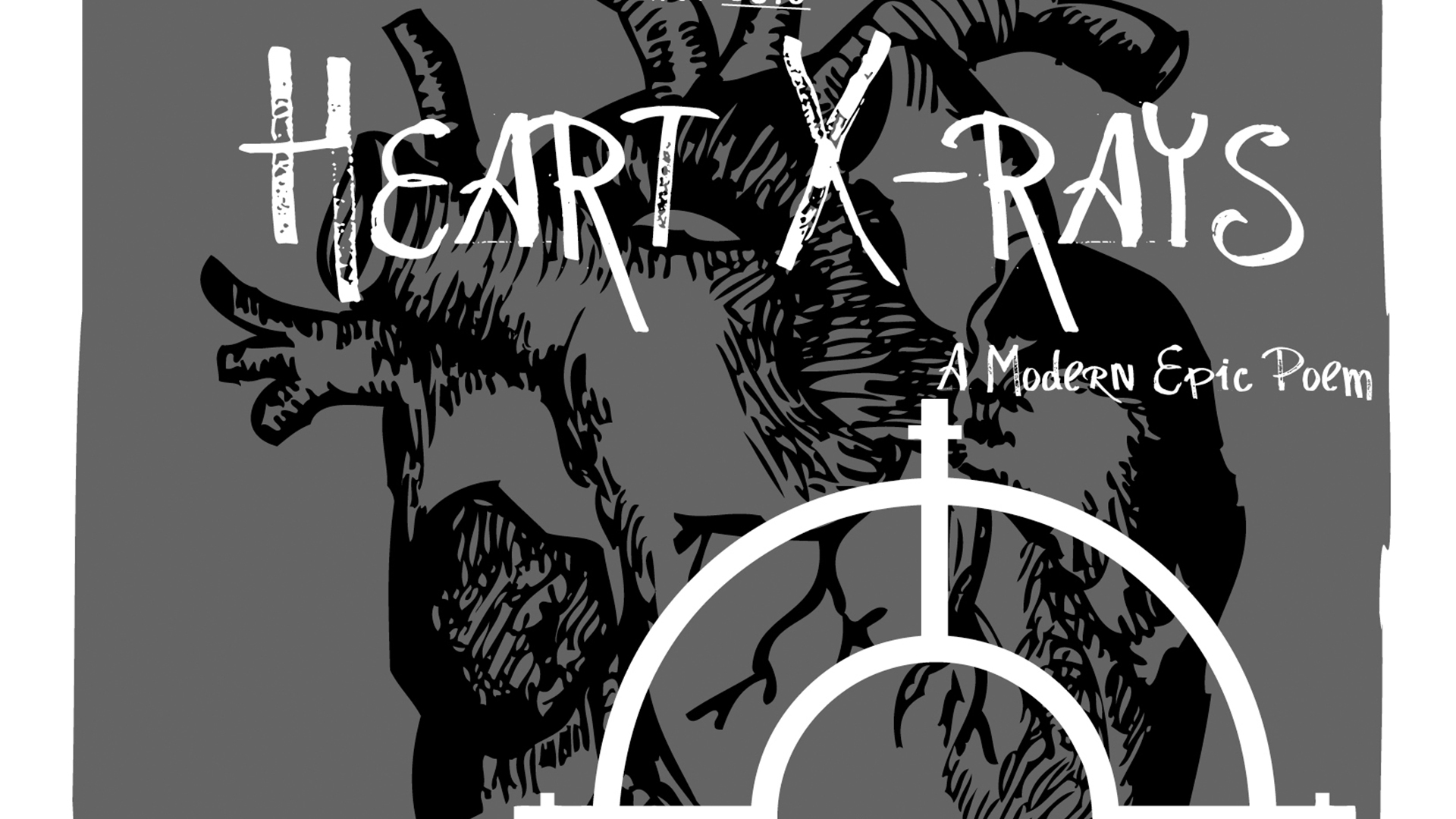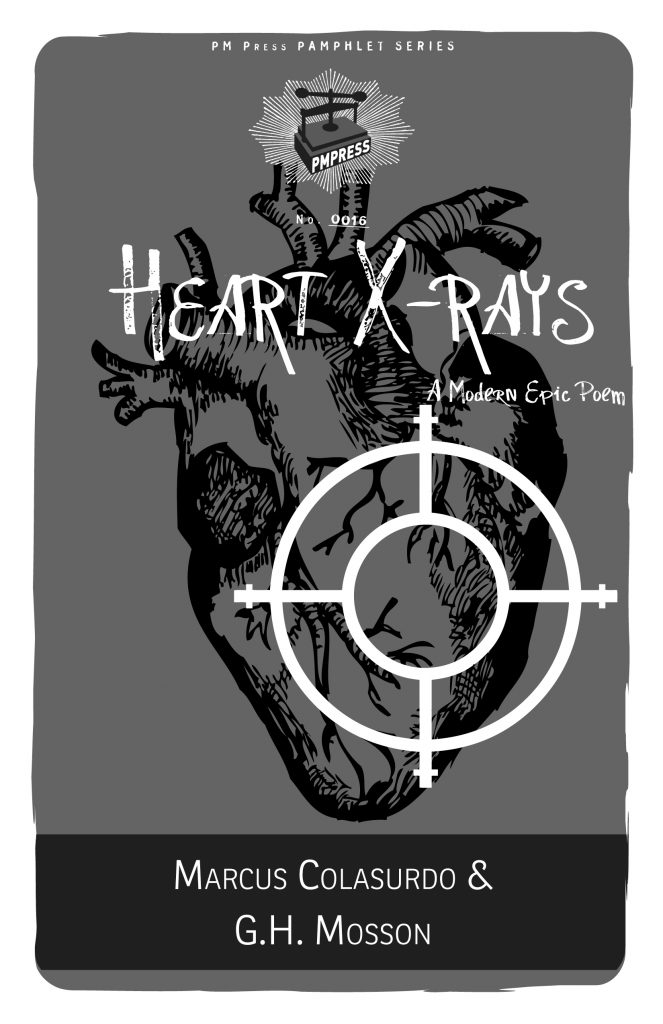by Djelloul Marbrook
JMWW Journal
February 8th, 2019
I think more highly of Heart X-rays now in my eighty-fourth year than I thought of Allen Ginsberg’s Howl when I heard him read it in 1956. There is both more and less than meets the eye in that statement. In 1956 I was considerably more callow than I am now. I admired Ginsberg’s prosody, which reminded me of Martha Graham’s dance, but not his intellect, which I thought operatic, nor his rhetoric, which I thought overwrought. I admire the powerful witness of Heart X-rays, its fine-tuning of prosody to the summons of content, its authenticity—all this because it recalls Howl in its hurt indignation and alarm.
Marcus
Colasurdo is a well-published blue-collar workingman, an activist, an
advocate of the disenfranchised. G.H. Mosson is a lawyer,
conservationist and fair-trade champion. They live and work in
multi-cultural Baltimore, a teeming, vibrant, tragic, triumphant city
that represents much of what is both right and wrong in our society.
This
“modern epic poem,” as they call Heart X-rays, does not have the often
elegant discipline of Howl, but its cantos—that’s what we must call
these titled poems if they’re to be thought of as a whole—are
structurally more restless and innovative than Howl’s.
Because
Heart X-rays, unlike Howl, is not overtly political, it often achieves a
trustworthy intimacy that Howl forfeits to make its expansive case.
I saw the best minds of my generation destroyed by madness, starving hysterical naked,
dragging themselves through the negro streets at dawn looking for an angry fix,
So
Howl begins, with such grandiosity that we forget the young Ginsberg
had not lived long enough to know which were the best minds of his
generation. He did see “madness, starving hysterical naked,” but he
strikes such a pretentious note, and strikes it so memorably, that we
put aside how pretentious and therefore suspect it is. Not so with
Colasurdo and Mosson. Take the poem “Charleston,” after the infamous
June 17, 2015, shooting:
Tonight, I don’t know which God
you’re praying to.
I can’t tell which flag you salute.
I am not certain
if you believe in ghosts—
but tonight I hear them sing:
Oh come, Oh come, Emmanuel….
These
two down-to-earth militants are not claiming a grand vision for
themselves; they’re not claiming to speak for a generation or represent a
movement. They’re witnesses. Like reporters, they’re letting what they
know, what they’ve seen, speak for itself.
The authority of the
high lonesome is present here—the authority of Nashville, which lies in
witness. Ginsberg had insight and vision, but he did not have when he
wrote Howl the experience that invites us to the dance here in Heart
X-rays. These poems are often like the exuberant young woman who cajoles
a timid young man to dance to the tunes he finds too edgy. These poems
are the heart in the act of witness.
Let’s call the road, time.
Let’s call the journey, us.
Let’s call the hints, maps.
Let’s call the lesson, love.
In these diverse songs is much of what makes Taylor Swift relevant, a fierce compulsion not to walk away from a recognition, a willingness to engage, to encounter, but not to lament or preach. They don’t intellectually overreach, and that’s much to be said, since many a poem is spoiled by its pretensions.
Who wedged the universe into an alphabet
within a computer screen? Scroll through
all the way. My homeless heart cannot fit
into any safe deposit box. It just left town.
Here’s
a question the press isn’t asking. Here’s news of an alienation the
press isn’t willing to confront. Here’s a way to confront it.
Heart X-rays
reminds us that in spite of unimpeachable evidence to the contrary the
press’s regrettable smart-alecky sector is always writing poetry’s
obituary precisely because poems like these address the elephants in the
room—from which the press in the boorish manner of Donald Trump is
moving heaven and earth to distract us. That is in fact the grandeur of
Howl, its utter refusal to be distracted by dolled-up trivia, and Heart
X-rays heartens us once again with poetry’s willingness to do battle
with the shibboleths and dogmas of our time, and the pigeonholes and
cages to which they consign us.
Colasurdo and Mosson, in a
demonstration of democratic commitment making no distinction as to who
wrote which poem, reveal to us the cutting edge, the real news of our
society as opposed to the white noise of our society which we call news
in our surrender to corporate myth-making.
Djelloul Marbrook,
poet, novelist, and former journalist, is author of several books
including Far From Algiers, winner of the 2007 Stan and Tom Wick Poetry
Prize, and most recently, The Seas Are Dolphin’s Tears (Leaky Boot Press, 2018)
Back to G.H. Mosson’s Author Page | Back to Marcus Colasurdo’s Author Page







